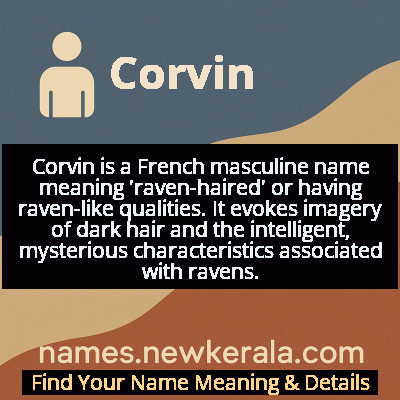Corvin Name Meaning & Details
Origin, Popularity, Numerology Analysis & Name Meaning of Corvin
Discover the origin, meaning, and cultural significance of the name CORVIN. Delve into its historical roots and explore the lasting impact it has had on communities and traditions.
Name
Corvin
Gender
Male
Origin
French
Lucky Number
9
Meaning of the Name - Corvin
Corvin is a French masculine name meaning 'raven-haired' or having raven-like qualities. It evokes imagery of dark hair and the intelligent, mysterious characteristics associated with ravens.
Corvin - Complete Numerology Analysis
Your Numerology Number
Based on Pythagorean Numerology System
Ruling Planet
Mars
Positive Nature
Generous, passionate, energetic, and humanitarian.
Negative Traits
Impulsive, impatient, moody, and can be overly emotional.
Lucky Colours
Red, maroon, scarlet.
Lucky Days
Tuesday.
Lucky Stones
Red coral, garnet.
Harmony Numbers
1, 2, 3, 6.
Best Suited Professions
Military, sports, philanthropy, leadership roles.
What People Like About You
Courage, energy, leadership, generosity.
Famous People Named Corvin
Corvin von Wittelsbach
Nobleman
Archbishop of Mainz and influential figure in the Holy Roman Empire
Mátyás Corvin
King
King of Hungary and Croatia, known for his Renaissance court and military successes
Corvin D. H. Cole
Author
British writer known for his historical novels and literary contributions
Corvin Sticher
Artist
German visual artist known for innovative mixed-media installations
Name Variations & International Equivalents
Click on blue names to explore their detailed meanings. Gray names with will be available soon.
Cultural & Historical Significance
The name's most famous historical bearer, King Mátyás Corvin of Hungary, established the Corvinian Library, one of Europe's greatest Renaissance libraries, cementing the name's association with learning and cultural refinement. This royal connection spread the name's popularity through aristocratic families across Central Europe, particularly in regions with French cultural influence. The name also appears in heraldry and coat of arms, often featuring ravens as central symbols, reinforcing its noble connotations. Throughout French literature, characters named Corvin often embody wisdom, strategic thinking, and sometimes mystical qualities, reflecting the name's deep cultural roots and symbolic richness.
Extended Personality Analysis
Individuals named Corvin are typically perceived as intelligent, observant, and possessing a natural curiosity about the world around them. They often exhibit the raven-like qualities of their name's meaning—sharp intellect, problem-solving abilities, and a tendency to notice details others might miss. Corvins are frequently described as strategic thinkers who approach challenges with careful analysis rather than impulsive action. They tend to be independent and self-reliant, valuing their personal space and freedom of thought.
While they may appear reserved at first, those who know them well appreciate their loyalty and depth of character. Many Corvins develop strong communication skills and often excel in fields requiring both creativity and analytical thinking. Their natural observational abilities make them excellent judges of character, though they can sometimes be perceived as aloof or overly cautious due to their thoughtful nature. In relationships, Corvins tend to be selective but deeply committed once trust is established, often forming bonds that last a lifetime. Their combination of intellectual depth and emotional loyalty makes them valued friends and partners who bring both wisdom and steadfastness to their relationships.
Modern Usage & Popularity
In contemporary times, Corvin maintains a distinctive presence as an uncommon but respected masculine name, particularly in French-speaking regions and among families with Hungarian heritage. While never reaching mainstream popularity charts, it has experienced a gradual resurgence in recent decades as parents seek unique names with historical depth and strong meaning. The name appeals to those looking for alternatives to more common classical names while still wanting something with cultural significance. In France, it ranks outside the top 500 names but shows steady usage among educated, urban families who appreciate its literary and historical connections. The name's rarity contributes to its appeal for parents wanting their child to have a distinctive identity while carrying a name with substantial cultural heritage and intellectual connotations. Social media and global connectivity have also helped spread awareness of the name beyond its traditional geographic boundaries.
Symbolic & Spiritual Meanings
Symbolically, Corvin represents intelligence, transformation, and mystery, drawing heavily from its raven associations. The raven in various mythologies serves as a messenger between worlds, symbolizing the ability to navigate different realms of understanding and consciousness. This connects to the name's symbolic meaning of bridging gaps in knowledge and perception. In alchemical tradition, the raven represents the initial stage of transformation—the 'nigredo' or blackening phase where matter breaks down before being reborn into something new. This makes Corvin symbolic of profound personal transformation and the pursuit of hidden knowledge. The name also carries connotations of protection and prophecy, as ravens were often seen as omens or guardians in ancient traditions. In modern symbolic interpretation, Corvin suggests someone who can see beyond surface appearances to deeper truths, embodying the qualities of wisdom, adaptability, and the courage to explore unknown territories both literal and metaphorical.

